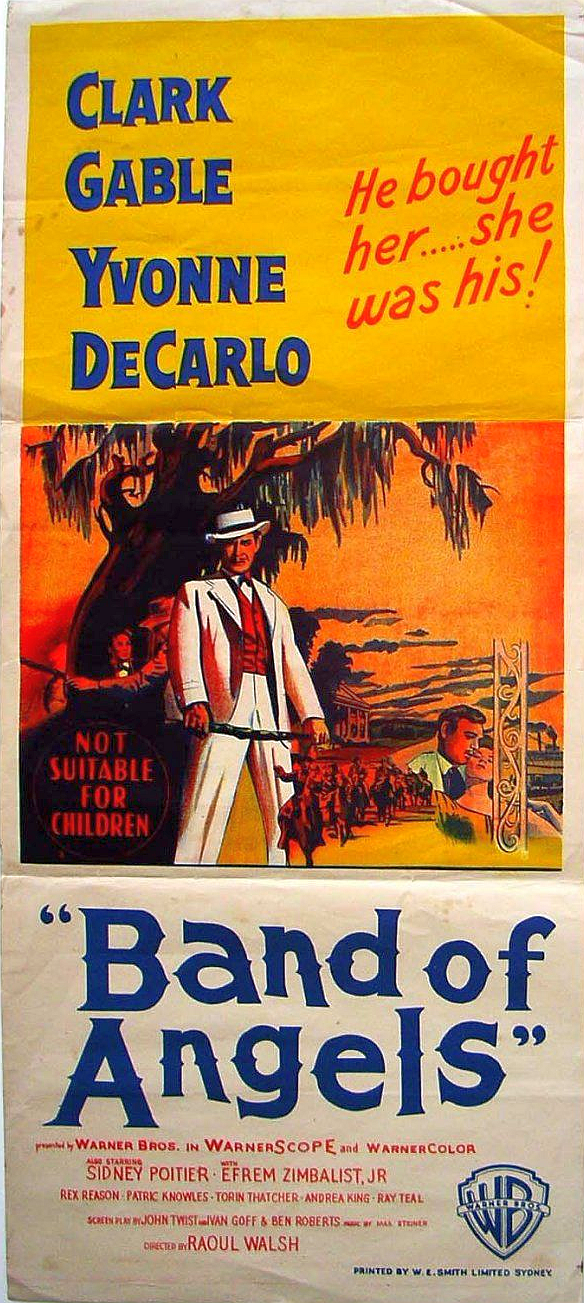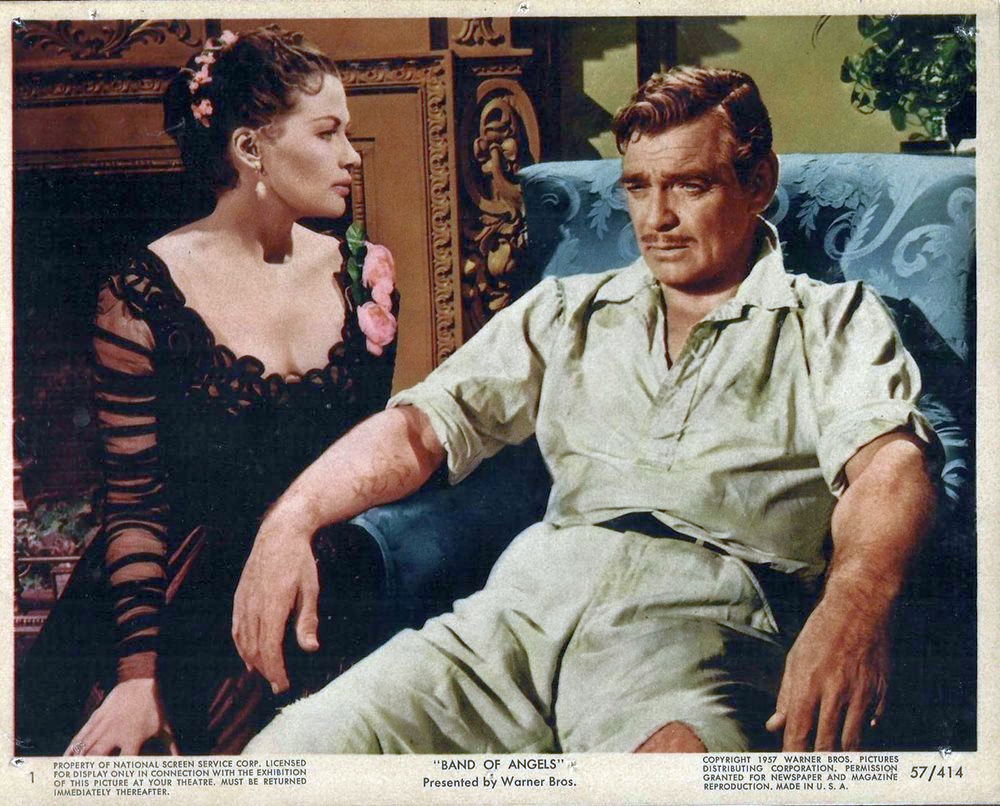Behold, film friends: the first review I ever published on the internet!
In August of 1998, two Turner channels, TCM and TNT, simulcast the 1957 Clark Gable and Yvonne De Carlo melodrama Band of Angels. Though TCM had mostly supplanted TNT and TBS as the “old movie channel,” as it were, TCM was still not yet on a lot of cable packages in 1998, so Turner would frequently show movies on two of their channels at the same time. They often also showed the TV edits of movies, a trivial tidbit mostly lost to the sands of time, but which I accidentally captured evidence of on VHS years ago when I recorded Victor/Victoria off of TCM.
The Band of Angels showing was pretty exciting stuff back in the day, and may have been the first time Turner showed the film after merging with Time Warner in 1996 and gaining access to the Warner Bros. library. But I didn’t watch it out of a film-lover’s desire to watch something previously unavailable, or for its cinematic history or its rareness or its novelty. I watched it for one reason: Rex Reason. He’s big, he’s beefy, he’s hot, and despite what I said in 1998 when I was blinded by his massive shoulders and chiseled jawline, he’s absolutely terrible. Folks, everyone is terrible in this movie. It’s a blustery, romantic, oversaturated WarnerColor fiasco, retrograde in its sociopolitical conscience even for 1957, an enormous fiery mess of a film that many people love.
I did not love it. In fact, I was so angry that I was spurred on to write my very first review on rec.arts.movies.past-films, where it got exactly zero (0) comments. Fair enough; it’s a terrible review, and I was way too old to be posting terrible reviews, but I did it anyway. What else was Usenet for?
Here then is my terrible review, painfully unedited even though I kept erroneously calling it A Band of Angels (ugh) and lacking any real insight or depth. You’re welcome, world.

On Aug 6, both TCM and TNT showed the 1957 movie “A Band of Angels.” It’s based on Robert Penn Warren’s novel, and from the little I knew about it, it seemed to get good reviews.
After having seen it, I have to wonder why.
“Band of Angels” contains some of the most laughably stupid dialogue I’ve heard. It’s done in typical 1950s Technicolor Pseudo-Epic style, complete with a star-studded cast and a wardrobe budget exceeding the entire annual income of Guam. Scored by Max Steiner and directed by the legendary Raoul Walsh, one would think that this movie could at least have some entertainment value.
It’s set in the 1860s American south. Clark Gable leads the cast, adding strength to the notion that in his later years, he often fell back on past successes (remaking “Mogambo”, for example.) “A Band of Angels” often borrows on the success of “GWTW” in style and subject, but the plot is quite different. Yvonne DeCarlo plays ‘Amantha Starr,’ a young woman that, upon her father’s death, discovers that she has a trace of “black blood” in her, and she is sold along with the other slaves from her father’s estate. She is bought for an exhorbitant price by Clark Gable as ‘Hamish Bond’, who apparently wants her for nothing more than eye candy. Sidney Poitier plays ‘Rhau-Rhou’, one of Gable’s slaves whose primary job is to run Cable’s cotton business. Other cast members include Rex Reason and Ephram Zimbalist, Jr, as well as a cast of thousands of African-American extras, whose role is to literally sing the praises of the white people they are enslaved to.
Which brings us to one of the biggest problems of the movie. The actors playing the parts of various slaves are made to do some of the most disgusting, racist stuff I’ve ever seen in a big-budget movie. The slaves are always over-sexed, stupid, and so happy to be slaves that it’s nauseating. One of the best examples of this is an extended scene, where Gable and DeCarlo approach a plantation. Literally hundreds of extras line the shoreline, singing and dancing, waiting to be able to wait on their master and his part-black slave mistress. Gable and DeCarlo are then placed in a flower-lined cart, and driven to the plantation, with the slaves following them the whole way, singing and laughing.
Women aren’t treated much better. When Amantha arrives to see her sick father, she shows up at the funeral. Already hysterical, she’s told that she is to be sold, since her mother was actually a half-black slave. Although she is surrounded by dozens of relatives, clergy, and slaves that supposedly love her, no one runs to help her. Then she walks to the carriage and allows herself to be taken off and sold; the crying and screaming for help sound silly, when no one is forcing her into the carriage.
Later, after being bought, a storm hits and the windows of her room at Hamish’s place fly open. She falls to the floor, unable and too weak to close the windows. Hamish Bond has to close the windows for her, and after less than a minute of insipid dialogue, she suddenly loves the man who has purchased her. Amantha runs to Bond, kisses him, and they spend a night of passion together.

Two of my favorite parts of this movie are Sidney Poitier and Rex Reason. Reason plays ‘Seth’, a theology student who courts Amantha before she is sold. Seth was an out-spoken man who disapproved of slavery and fought to change the opinions of the slave-holding society he lived in. After Amantha eventually gets freedom — or a somewhat acceptable version of it — she and Seth run into each other again. Seth knows what has happened to her, and his lust and loneliness drive him to discard his previous ways. In a moment of weakness, Seth declares he doesn’t care that Amantha is a negress, and attempts to force her into having sex with him. It’s apparent that Seth doesn’t regard her with as much respect as he used to, not because she was Hamish Bond’s lover, but because of her race.
Rex Reason was often dismissed as a cardboard cutout rather than an actor. Probably most famous for his role in “This Island Earth”, his
looks and charisma carried him into many roles. But in “A Band of Angels,” Reason shows that he has some true acting ability. The look on his face when he realizes what he has done to Amantha is pure sorrow and a little self-loathing. One leaves that scene realizing that Seth will have a lot of long, hard nights thinking about what he has just done.
Sidney Poitier is excellent in the movie as always. While Hamish and Amantha are one-dimensional characters who serve only to move the plot forward, Rhau-Rhou ends up with a lot of the choice dialogue. Not only does it make sense (Hamish and Amantha, sadly, don’t always make sense), but what he says is often the crux of the issues presented in the story. Rhau-Rhou, and to a lesser extent Seth, are the ones who clearly show the evils of slavery. Rhau-Rhou chastises Amantha, explaining that even though he was treated like Hamish’s son and given everything he could want in life, he was still a slave, and it was this kind of kindness in slavery that disguised the real evils. People saw how well the slaves were
treated and thought nothing was wrong, and that was the biggest of slavery’s many evils. Rhau-Rhou also fought Amantha on the fact that she denied her ethnic heritage. He insisted that she was part black and that she should accept it, maybe even embrace it, instead of living life trying to hide it.
Until Rhau-Rhou’s speech, one doesn’t realize that Amantha is necessarily hypocritical. The character of Amantha is not fully explored,
and the details (read: “the good parts”) are hidden until another character gets a chance to explain it.
Often the viewer isn’t given a chance to figure things out on their own. A good movie will hold the viewer, and allow them to piece together information to come to some sort of conclusion. “A Band of Angels”, even in the best scenes, just comes out and tells the viewer what is going on. There’s almost a total lack of suspense, and the decidedly Hollywood happy ending does nothing but reinforce this.
The dialogue, especially in the first half of the movie, is so poor it’s embarassing. The writers got ahead of themselves in many spots, leaving out details and instead opting for the “tell the viewers what to think” approach. One gets the feeling that many sentences of dialogue were cut out of every scene. Almost all of the dialogue involving Amantha and Hamish had a sort of disjointed feel where the meaning was almost entirely obscured.
The bottom line: if you must see this movie, watch it for the performances of Poitier and Reason. However, if you like campy
Technicolor films from the 1950s, you’ll probably enjoy this. It’s high-budget camp, which isn’t all bad.
—
This review was originally posted on rec.arts.movies.past-films on August 8, 1998.

Finally! After checking for a couple of years and seeing all that spandex in the photographs from Roller Boogie, it’s great to know you’re back.
And it was blurry spandex too, the photo never rendered right on WordPress! Infuriating!
Really nice to see you again, Chris xx